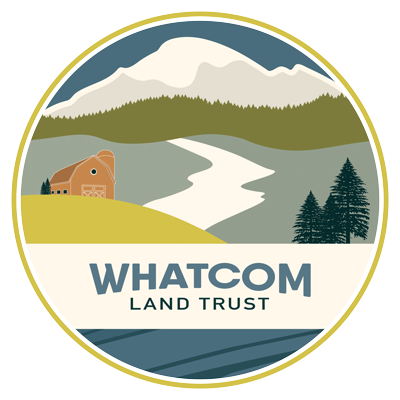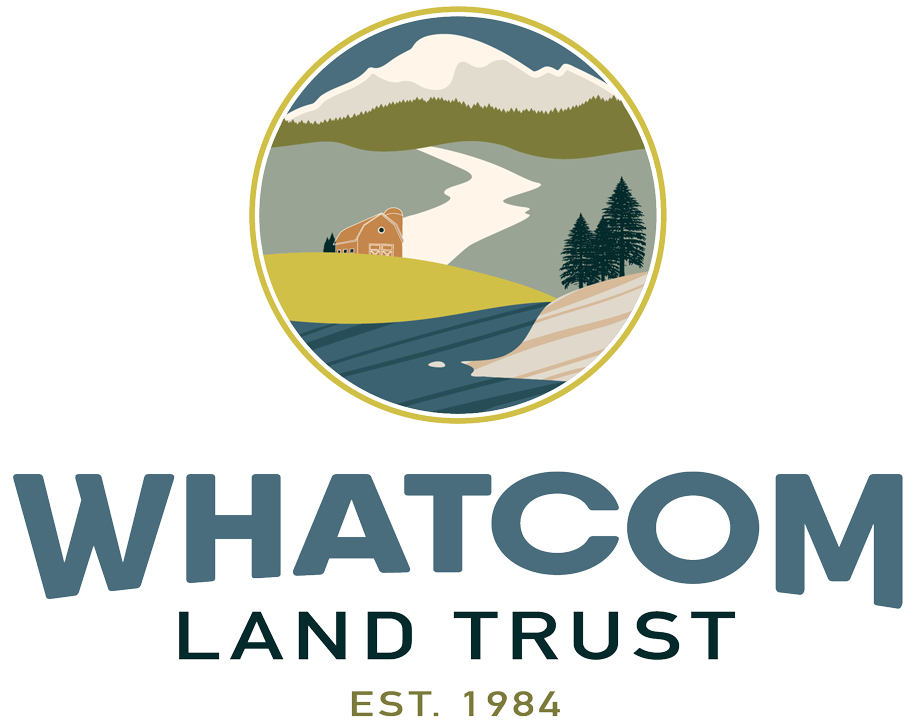


There are so many reasons that Whatcom County is a special place, from its sweeping shorelines and marine estuaries, to its forested mountain sides and rivers. However, another crucial thread of the vibrant tapestry is farmland. Agriculture is one of the three dominant land uses in the County, and an integral piece of its history and culture. The Land Trust is dedicated to preserving and supporting this land use through programs like the County’s Conservation Easement Program (formerly the “Agricultural Purchase of Development Rights Program”), leasing land for agricultural purposes, or partnering with farmers to create innovative ways to continue their work. Most recently, the Land Trust closed on the sale of 54 acres of land to Osprey Hill Farm, a small organic farm that’s working towards sustainability in the South Fork Nooksack Valley.
Anna and Geoff Martin originally didn’t plan on becoming farmers, but they’ve now owned and run Osprey Hill Farm for seventeen years. They believe it’s important to not work against nature, but to instead work with it. “The beauty of nature is that it is the model of regeneration,” Anna Martin says of their approach to agriculture. As such they structure their farming in a way that works alongside the natural world, taking inspiration from it as opposed to trying to control it. They were influenced initially by the practices of permaculture and wildcrafting, which they have now built into their farming practices at Osprey Hill. They’ve planted food forests, also called forest gardens, which are diverse plantings of edible plants that endeavour to mimic natural patterns and ecosystems.These food forests are dynamic, with multiple levels of plants growing in symbiosis with each other instead of simply in rows. They also provide shade, which allows their animals to graze and run between the rows. As they do they spread their manure through the fields, which in turn provides vital nutrients to the soil and plants. The Martins also run a licensed butchery in Acme for the poultry chickens they raise on the farm. The meat is sold, but the rest of the chicken, which would normally constitute waste, is returned to the farm to be composted and later used as fertilizer for their fields, nourishing the land and reducing waste products at the same time.
This sort of innovative sustainable farming is completely in line with the Land Trust’s mission, making this the perfect partnership. The parcel of land, former pastureland supporting a local dairy, is now going to be used in part for growing elderberries, an exciting prospect as the farm begins to move away from vegetable production and back to the Martins’ roots in wildcrafting and permaculture. “The Land Trust was very generous,” Anna says of the process in making the newest expansion of Osprey Hill Farm a reality. The development rights associated with the property have been sold, meaning it will remain as agricultural land permanently, and additional protections have been placed around the tributary of the South Fork Nooksack which cuts through the northeastern edge of the parcel to ensure that the precious resource is preserved. The Land Trust also acquired a perpetual conservation easement on the property when selling to Osprey Hill Farm, ensuring the land will be conserved forever. Farmers like the Martins understand the need to protect the South Fork. “Without water we don’t have life,” Anna says, whether that life be thriving agricultural lands or healthy populations of salmon, elk, and eagles.
Osprey Hill Farm shows that agriculture and sustainability go hand in hand, providing benefits for each other. Sustainable agriculture can work in harmony with conservation efforts to give back to the land, as well as providing a valuable resource in fresh, organic, delicious food for the Whatcom County community. Whatcom Land Trust is committed to helping find local solutions which will ensure that the bounty of Whatcom County stays intact for generations to come.


